Picking the best among SEMrush and Similarweb
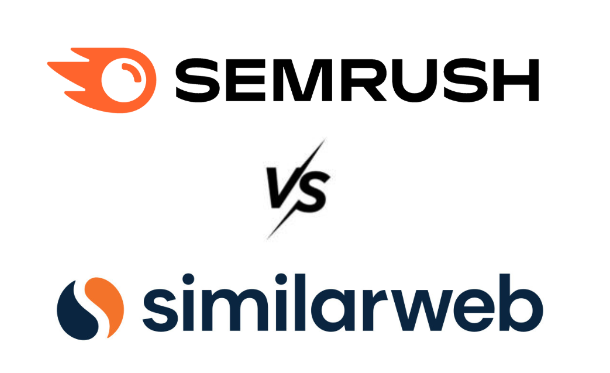
When it comes to SEO tools, SEMrush stands out as one of our favorites. With its extensive features designed for online visibility and content marketing, SEMrush’s range of tools has earned the trust of over 7 million marketers worldwide. It’s also been recognized with several prestigious awards, including the US, UK, European, MENA, and Dutch Search Awards.
Depending on what you’re looking to achieve—whether it’s SEO, content marketing, advertising, social media management (SMM), or online reputation management (SERM)—SEMrush has you covered with the right tools to support your efforts.
Let’s take a closer look at how SEMrush helps across various domains:
SEO Tools Overview
Keyboard Research Tools
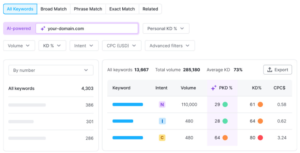
SEMrush offers a complete suite of keyword tools to help you uncover high-value keywords, assess their competitiveness, and discover keyword gaps.
You can explore six sub-tools under this category, including Organic Research, Keyword Magic Tool, Keyword Gap, Keyword Manager, and Organic Traffic Insights. These tools allow you to tailor your strategy by evaluating keyword potential and competitiveness in real-time.
Technical SEO Tools
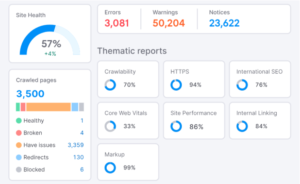
To ensure your website ranks high, SEMrush provides technical SEO tools that analyze how your site interacts with Google. With tools like the Log File Analyzer, Site Audit, and On-Page SEO Checker, you’ll gain insights into your website’s health and receive actionable recommendations for improvement.
Local SEO Tools
For businesses targeting local customers, SEMrush’s Local SEO Tools help you enhance your visibility. Tools like the Social Media Toolkit, Listing Management, and Position Tracking will assist in monitoring growth and boosting your presence in local search results.
Position Tracking
SEMrush’s Position Tracking tool gives you a competitive edge by constantly monitoring how you rank on Google’s Search Engine Results Pages (SERPs). With the Ranks and Sensor tools, you can discover new opportunities and optimize your online presence.
Link Building
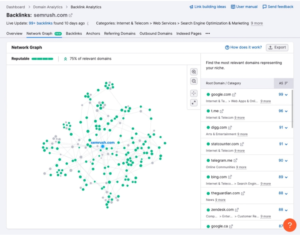
Building high-quality backlinks is crucial for SEO success.
SEMrush’s Link Building tools, including Backlink Gap, Backlink Audit, and Outreach Campaigns, help you elevate your backlink profile and track your progress.
SEO Competitive Analysis
With just a few clicks, SEMrush lets you gauge where your competitors stand, helping you refine your strategy and stay ahead of the curve.
Content Strategy and Optimization
Content Marketing
SEMrush’s tools empower you to develop a data-driven content marketing strategy, allowing you to merge creativity with analytics. With features like the Content Audit, Topic Research, SEO Writing Assistant, and Post Tracking, you can plan, create, and measure content that resonates with your audience.
Content Creation and Distribution
Need fresh content? SEMrush makes it easy to order professionally written, traffic-driving blog posts and distribute them to your audience. Tools like the Social Media Poster and Content Marketplace streamline your content creation and distribution process.
Content Optimization
Stay on top of SEO by optimizing your content in real-time. Whether you’re working in WordPress or Google Docs, SEMrush offers tools to provide instant feedback on SEO performance and generate search-friendly content.
Content Marketing Analytics
With SEMrush’s analytics tools, you can effortlessly track your content’s performance, identify areas for improvement, and fine-tune your strategy for better results.
Market Research
Competitor Analysis
Understanding your competition is key to staying competitive. SEMrush’s advanced marketing tools provide a deep dive into your rivals’ marketing strategies, website traffic, advertising efforts, social media performance, SEO efforts, and more.
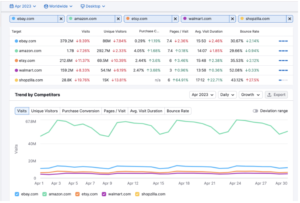
This insight gives you the data you need to outmaneuver the competition.
Additional market research tools include Market Analysis, Paid Advertising, and Competitor PR Monitoring to round out your competitive strategy.
Why SEMrush Outshines SimilarWeb
Both SEMrush and SimilarWeb offer valuable insights across SEO, PPC, and traffic analysis. However, SEMrush edges ahead when it comes to identifying SEO issues and providing solutions based on best practices and ranking algorithms.
On the other hand, while SimilarWeb excels in areas like mobile marketing (app performance on Apple’s App Store and Google Play Store) and website statistics, SEMrush provides a more comprehensive toolkit. This includes not only SEO and PPC but also online visibility and social media analytics.
For an in-depth look at how to master SEMrush’s powerful features and get the most out of them, check out our Comprehensive Guide to Using SEMrush.
Key Differences: SEMrush vs. SimilarWeb
When comparing SEMrush and SimilarWeb, it’s important to note their unique strengths. SEMrush stands out in SEO capabilities, providing detailed insights and actionable solutions. Its tools, such as the Site Audit Tool and Keyword Magic Tool, offer thorough analysis and recommendations for improving your website’s SEO. In contrast, SimilarWeb focuses more on high-level traffic analysis and market insights, which can be useful for understanding broad traffic trends but lacks the depth of SEO optimization features provided by SEMrush.
Data accuracy is another key differentiator. SEMrush boasts a robust database of over 20 billion keywords, ensuring precise and reliable data for SEO tasks. This level of accuracy is essential for effective keyword research and site optimization. On the other hand, SimilarWeb relies on web crawlers and user panels, which can result in a wider margin of error. While its data is valuable for high-level market estimates, it may not be as reliable for detailed SEO analysis.
Both platforms offer specialized features tailored to different needs. SEMrush excels in providing tools for SEO, including in-depth keyword analysis and backlink evaluation. It also shines in PPC analysis, offering insights into competitor ad spending and helping you optimize your paid search campaigns. Conversely, SimilarWeb excels in traffic estimation and mobile app performance. It provides valuable insights into app downloads and performance on app stores, areas where SEMrush is less detailed.
In terms of website analytics and visibility, SimilarWeb provides strong insights into traffic trends and user behavior, helping you benchmark your website against competitors. SEMrush, however, combines these metrics with deeper SEO insights, such as keyword ranking monitoring and site performance analysis, offering a more comprehensive view of your website’s online presence.
When it comes to keyword and site audits, SEMrush delivers detailed analysis through tools like the Keyword Magic Tool and Site Audit Tool. These features help you discover keyword opportunities and resolve technical issues with precision. SimilarWeb provides some keyword insights but lacks the in-depth research and auditing capabilities that SEMrush offers.
Finally, SEMrush provides robust social media tools and insights into competitors’ online ad spending, which can be valuable for managing and analyzing your social campaigns. SimilarWeb, while strong in traffic data, does not offer the same level of social media or PPC insights.
Which One Should You Choose?
In choosing between SEMrush and SimilarWeb, consider your specific needs: SEMrush excels in providing comprehensive SEO tools, precise keyword analysis, and in-depth competitive insights, while SimilarWeb offers valuable high-level traffic and app performance data. Ultimately, the right choice will depend on which features align best with your goals for SEO and digital marketing success.


If you’re looking for a broader perspective on top SEO tools that can help you rank higher on Google, check out our Top 5 SEO Tools To Rank #1 On Google. This guide will give you additional insights into the tools that can enhance your SEO strategy.








